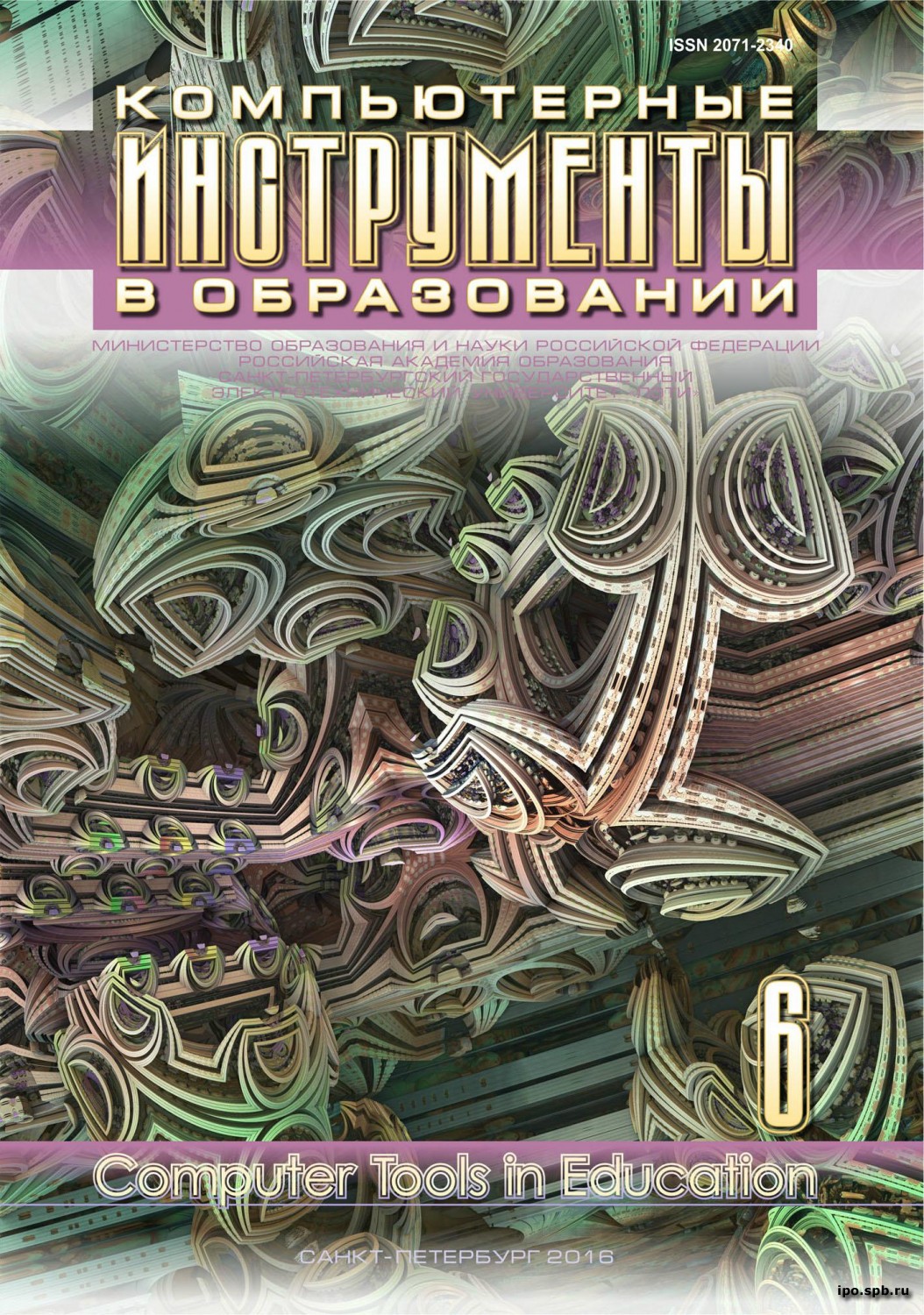Smart School Laboratory for Automation of Laboratory Works
Abstract
Nowadays Ambient Intelligence or Smart Environment systems are widely used both in Russia and in the world. General usage of such kinds of systems is the creating comfortable environment for people (“smart” houses for increasing habitants’ comfort, health caring, services for elderly people, enhancement of comfort in offices and at home etc.). At the same time in the world there is the innovative tendency of applying Smart Environment systems to educational process. In this paper architecture and basic principles of Smart school laboratory are considered. Smart school laboratory is designated to help teachers and students during laboratory works. Proposed Smart school laboratory allows improving the laboratory works’ efficiency therefore the quality of educational process will improve accordingly. Smart school laboratory allows students to obtain knowledge, experiences and skills, predetermined by national educational standards.
References
[2] W. R. Weber, J. M. Rabaey, and E. Aarts Eds., Ambient Intelligence, Springer, 2005.
[3] A. V. Gavrilov “Hybrid Intelligent Systems in Ubiquitous Computing” in Designing Solutions-Based Ubiquitous and Pervasive Computing: New Issues and Trends. Information Science Publishing, 2010, pp. 263–281.
[4] A. V. Gavrilov, “Iskusstvennyi Domovoi” [Artificial Brownie], Iskusstvennyi intellekt i prinyatie reshenii, no. 2, pp. 77–89, 2012 (in Russian)
[5] P. S. Pandian et al. “Smart Vest: Wearable multi-parameter remote physiological monitoring system,” Medical & Engineering Physics, vol. 30, no. 4, pp. 466–477, 2008; doi:10.1016/j.medengphy.2007.05.014
[6] L. Young-Dong and C. Wan-Young, “Wireless sensor network based wearable smart shirt for ubiquitous health and activity monitoring,” Sensors and Actuators B: Chemical, vol. 140, no. 2, pp. 390–395, 2008; doi:10.1016/j.snb.2009.04.040
[7] P. Mikulecky, “Smart Environment for Smart Learning” in 9 Int. Scientific Conference on Distance Learning in Applied Informatics (DIVAI), Štúrovo, Slovakia, 2012, pp. 213–222.
[8] R. Azevedo et al. “MetaTutor: An Intelligent Multi-Agent Tutoring System Designed to Detect, Track, Model Foster Self-Regulated Learning” in The Fourth Workshop on Self-Regulated Learning in Educational Technologies (SRL&ET), 2012.
[9] V. Efthymiou, M. Koutraki, and G. Antoniou “Real-Time Activity Recognition and Assistance in Smart Classrooms” Advances in Distributed Computing and Artificial Intelligence Journal, vol. 1, no. 1. pp. 9–22, 2012; doi:10.14201/ADCAIJ201211922
[10] A. V. Gavrilov, Y. V. Novitskaya, and T. A. Yatsevich “Umnaya uchebnaya laboratoriya” [Smart school laboratory], in Robototekhnika i iskusstvennyi intellekt: materialy 5 Vseros. nauch.-tekhn. konf. s mezhdunar. uchastiem (RII), Zheleznogorsk, Russia, 2013, pp. 126–134.
[11] A. V. Gavrilov, Y. V. Novitskaya, and T. A. Yatsevich, “Towards a smart school laboratory” in 10 Int. Scientific Conference on Distance Learning in Applied Informatics (DIVAI), Štúrovo, Slovakia, 2014, pp. 65–74.
[12] Y. V. Novitskaya and A. V. Gavrilov, “O primenenii tekhnologii «umnykh sred» k avtomatizatsii provedeniya laboratornykh rabot” [About application of technologies of "clever environments" to automation of carrying out of laboratory works] in Integrirovannye modeli i myagkie vychisleniya v iskusstvennom intellekte: 8 mezhdunar. nauch.-prakt. konf., Kolomna, Russia, vol. 1, 2015, pp. 410–417 (in Russian)
[13] Y. V. Novitskaya, A. V. Gavrilov, and S. A. Strekalovskiy “Event monitoring system of smart school laboratory” in 16 International conference of young specialists on micro/nanotechnologies and electron devices (EDM), Altai, Russia, 2015. pp. 116–119.
[14] Y. V. Novitskaya and A. V. Gavrilov, “Expert System of the Monitoring Module for Smart School Laboratory,” in 11 Int. Forum on Strategic Technology (IFOST), Novosibirsk, Russia, vol. 3, 2016, pp. 272–275.
[15] E. L. Romanov, “Avtomatizatsiya ucheta reitinga uspevaemosti studentov” [Automation of accounting of students' performance rating], Otkrytoe i distantsionnoe obrazovanie, no. 2, pp. 55–62, 2014 (in Russian)
[16] T. A. Nguyen et al. “Towards Context Consistency in a Rule-Based Activity Recognition Architecture,” in 10 Int. Conference on Ubiquitous Intelligence & Computing and 10 Int. Conference on Autonomic & Trusted Computing (UIC-ATC), Italy, 2013, pp. 625–630.
[17] A. V. Gavrilov and Y. V. Novitskaya, “The Toolkit for Development of Hybrid Expert Systems,” in 5 Int. Symp. KORUS, Tomsk, Russia, vol. 1, 2001, pp. 73–75.
[18] A. V. Gavrilov and N. A. Chistykov “An Architecture of the Toolkit for Development of Hybrid Expert Systems,” in 2 Int. Multi-Conference on Automation, Control and Applications (ACIT-ACA), Novosibirsk, Russia, 2005, pp. 116–120.
[19] J. Schmidhuber “Deep learning in neural networks: an overview. Tech. Rep. IDSIA-03-14,” University of Lugano & SUPSI, Switzerland, 2014.
[20] A. V. Gavrilov and V. M. Kangler, “Neiromorfnye tekhnologii: sostoyanie i perspektivy razvitiya” [Neuromorphic technologies: state and prospects of development] in Robototekhnika i iskusstvennyi intellekt: materialy 7 Vseros. nauch.-tekhn. konf. s mezhdunar. uchastiem (RII), Zheleznogorsk, Russia, 2016, pp. 148–154 (in Russian).
[21] A. V. Kolesnikov, Gibridnye intellektual'nye sistemy: Teoriya i tekhnologiya razrabotki [Hybrid Intelligent Systems: Theory and Technology of Development], St. Petersburg: Izd-vo SPbGTU, 2001 (in Russian).
[22] A. V. Gavrilov, Gibridnye intellektual'nye sistemy: monografiya [Hybrid Intelligent Systems: Monograph], Novosibirsk, Russia: Izd-vo NGTU, 2003 (in Russia).
[23] A. V. Gavrilov, “Arkhitektura “dvukhpolusharnoi” ekspertnoi sistemy,” Sistemy iskusstvennogo intellekta, Novosibirsk, Russia: Izd-vo NGTU, 1993, pp. 10–14 (in Russia).
[24] A. V. Gavrilov and Y. V. Novitskaya, “Arkhitektura “dvukhpolusharnoi” ekspertnoi sistemy” [The architecture of the "two-hemisphere" expert system], Kibernetika i VUZ. Intellektual'nye informatsionnye tekhnologii, Tomsk, Russia, 1994 (in Russia)
[25] SWI Prolog [Online]. Available: http://www.swi-prolog.org

This work is licensed under a Creative Commons Attribution 4.0 International License.







